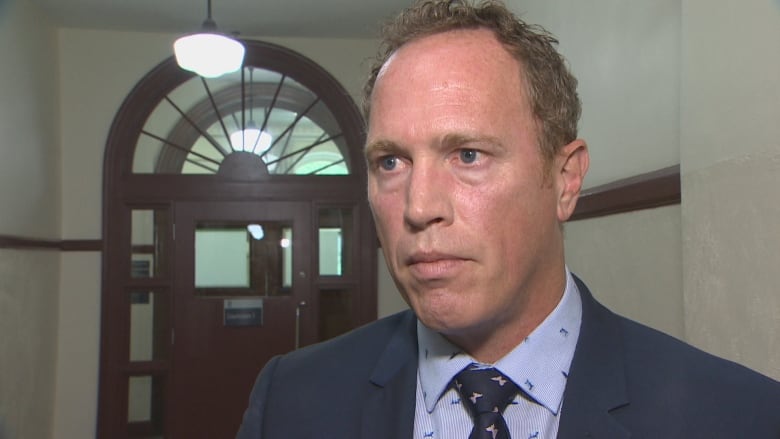Connexion
Dernières nouvelles
Pénurie de procureurs : vers l’abandon de poursuites
Les procureurs de la Couronne craignent le pire devant la crise qui ralentit le fonctionnement du système de justice pénale au Nouveau-Brunswick. Des appels à l’aide ont été lancés depuis deux semaines. Me Yves Duguay, vice-président de l’Association des procureurs de la Couronne du Nouveau-Brunswick et procureur à Bathurst, avoue que ça fait un moment que la situation est inquiétante.
[ ...Suite ]Date de parution : 2024-03-27
B.C. prosecutors' association raises security concerns about Vancouver courthouse following assault
The association that represents B.C.’s roughly 450 Crown prosecutors is raising safety concerns around an East Vancouver courthouse after a member was allegedly assaulted outside last week. "We’re reeling, this has really shaken us to the core to have one of our own attacked right here,” said BCCCA president Adam Dalrymple.
[ ...Suite ]Date de parution : 2024-02-05
Increased number of homicides doesn't bode well for overworked N.L. prosecutors, association says
There are 17 homicide cases before the courts in Newfoundland and Labrador, and the head of the association that represents local prosecutors says the higher-than-normal caseload will be difficult to handle.
[ ...Suite ]Date de parution : 2023-09-07
Manitoba adds 25 Crown attorneys to prosecution service amid workload issues
The Manitoba government hopes to add about two dozen more prosecutors and assistants to the prosecution service, which attorneys say has been struggling to keep up amid workload and workforce issues. Manitoba Association of Crown Attorneys says province left group out of discussions.
[ ...Suite ]Date de parution : 2023-06-26
Les Leyne: Premier David Eby takes on lawyers — again
The B.C. NDP government has introduced a one-page bill that bestows the right to join a union on the 350 lawyers who work for government. There’s a catch. It herds them into a union the government prefers, the Professional Employees Association, rather than allowing them to form their own.
[ ...Suite ]Date de parution : 2023-05-06
'Unfair labour practice': B.C. government accused of blocking union bid by its own lawyers
Lawyers for the B.C. government say the province has ended negotiations with them ahead of legislation they claim aims to block their right to form their own union.
[ ...Suite ]Date de parution : 2023-05-04
<-- Retour au nouvelles archivées
Shoplifting and other petty-crime cases are being dropped by courts
30-05-2019

Across the country, shoplifting cost retailers about $5 billion in losses in 2018, according to estimates made by the Retail Council of Canada. (SpeedKingz/Shutterstock)
Across Canada, people accused of petty crimes like shoplifting, minor assault and fraud are walking free — because the justice system doesn't have time to deal with their cases, as it struggles to move more serious crimes through the courts.
The president of Canadian Association of Crown Counsel says cases involving less serious crimes are either being dropped outright or shunted into restorative justice programs. He called it a regular occurrence, though specific numbers weren't available.
"At some point, we have to make a decision: what crimes do you want us not to prosecute?" said Rick Woodburn, whose organization represents 7,500 Crowns across the country.
"And as you can see, it starts falling off the bottom. And sooner or later, we're going to decriminalize, because we're not prosecuting certain types of offences."
Prosecutors are choosing to focus on major crimes like homicides and sexual assaults because of what's known as the Jordan decision. A Supreme Court of Canada ruling issued in July 2016 that found the drug convictions of Barrett Richard Jordan had to be set aside because of an unreasonable delay.
The court then set down new rules for unreasonable delays. In provincial court, if a case is delayed by 18 months, it's considered unreasonable. In superior court, 30 months is the limit.
Woodburn said that's led to courts adopting a "triage system" where the worst, most serious crimes are focused on to get them through the courts quickly and avoid the chance that the case will be thrown out because of delays.
"Lower-end charges [are] being triaged and falling off our radar, because we have to keep an eye on the bigger cases of the homicides, sexual assaults, robberies," said Woodburn.
"When we look at our schedules, we have to make sure they're falling within the Jordan timelines and that court time is not getting eaten up by a fraud under $200."

Rick Woodburn is president of the Canadian Association of Crown Counsel. (Craig Paisley/CBC)
But just because a crime is considered petty by the courts doesn't mean it doesn't have an impact.
The Retail Council of Canada is worried about shoplifting cases being dropped. The council represents over 45,000 retail merchants across the country.
"It's really concerning for retailers, retailers of all sizes," said Jim Cormier the council's Atlantic director. "The deterrent for theft and shoplifting in stores is, of course, often that there can be legal consequences."
Last year, the retail council estimated that shoplifting accounts for up to $5 billion a year in losses for Canadian retailers. Cormier said shoplifting has an awful impact on retailers, and if it happens enough, it will cut into a company's profits.
"Less profits means less ability to hire and pay staff. You know it means less tax revenue for the cities and towns in which these retailers are doing their business," said Cormier.
Stephen O'Keefe, a consultant who helps companies with loss prevention, said it pains him when courts throw out shoplifting cases.
"When you have a company that experiences shrinkage in excess of their net profit, they have to shut their doors. We've experienced that in Canada over past years where we've had major brands, major retailers, who have closed their doors because they can't absorb those shrinkage charges."
To recoup some of the costs associated with shoplifting, some retailers are forgoing criminal court altogether and instead are taking their grievances with shoplifters to civil court, said O'Keefe.
At civil court the retailers aim to get money out of the accused for the item they allegedly stole and the cost of the store's investigation into the shoplifting.

Court rooms across the country are seeing less petty crime cases as judges, lawyers and court staff try and move more serious crimes through the justice system. (Mark Crosby/CBC)
But that doesn't do anything to stop cases from being dropped by the criminal court.
Woodburn said the only way to do that is for provincial governments and the federal government to step up and provide more money and resources, including more Crowns, judges, court staff and defence lawyers. Unless more resources are provided, more delays and dropped files are inevitable, said Woodburn
"Judges and justices are working themselves into the ground, Crowns are drowning in workload, defence lawyers are the same," he said. "You see them overworked. Staff and others are working overtime just to make sure people's rights are not being infringed, and that as it is now is unsustainable."
Overall economy
The Retail Council of Canada also wants governments to help start repairing any holes in the justice system.
"We would encourage government to step up and understand that this is a public safety issue as well as a public confidence issue as well as a retail business issue. Retail is the No. 1 private sector employer in every single province across Canada. Therefore this is an issue that should matter to the overall economy of our country," said Cormier.
In an email, the Federal Department of Justice said that it has worked to make sure resources are in place for "effective, efficient, and fair court processes."
Since 2015, there have been 300 judicial appointments to superior courts across Canada in an effort to fill vacancies and respond to trial delays, according to department spokesperson Ian McLeod.

Jim Cormier is the Atlantic director of the Retail Council of Canada. (Paul Palmeter/CBC)
And the Government of Canada has funded positions for more than 70 new judges for provincial and territorial courts in its 2017 and 2018 budgets. Budget 2019 has also committed $89 million to Public Prosecution Service of Canada.
McLeod also points out that Bill C-75, which is currently before the Senate, could help cut down on delays in the criminal justice system. Bill C-75 would amend the Criminal Code, The Youth Criminal Justice Act and many other Acts.
Nova Scotia's Department of Justice is also trying to cut down on court delays.
The department said it's working to "modernize, adapt and innovate to make it easier for all Nova Scotians to access the justice system and reduce unreasonable delays,"said Heather Fairbairn, spokesperson for the Justice Department.
Fairbairn said in an email that improved case management for Crowns, early resolution options, increasing the use of video court, and expanding the restorative justice program for adults will all help make sure the justice system is resourced properly.
Despite all that, Woodburn said he hasn't seen many changes on the ground.
"Our justice system is crumbling both on a federal level and provincial level, and resources need to be injected in order to make sure it doesn't fall apart completely."
https://www.cbc.ca/news/canada/nova-scotia/crime-shoplifting-court-justice-delays-1.5153828

